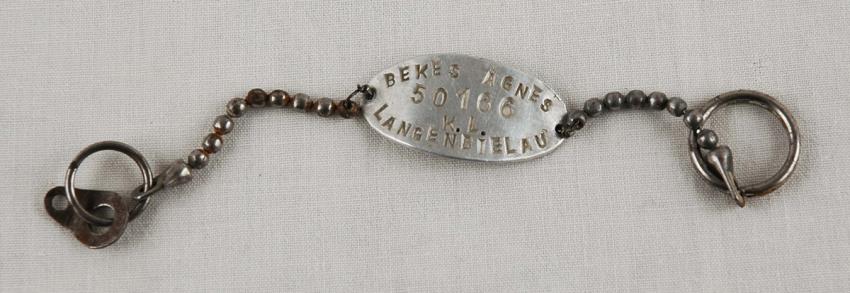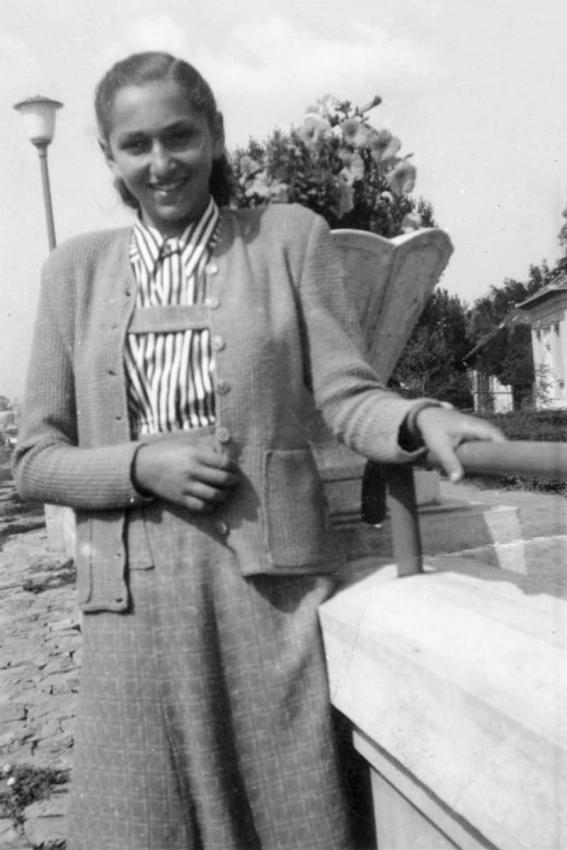
Yad Vashem Artifacts Department
Donated by Leah Klein (Agnes Bekes), Jerusalem, Israel


Yad Vashem Artifacts Department
Donated by Leah Klein (Agnes Bekes), Jerusalem, Israel

Sunday to Thursday: 09:00-17:00
Fridays and Holiday eves: 09:00-14:00
Yad Vashem is closed on Saturdays and all Jewish Holidays.
Entrance to the Holocaust History Museum is not permitted for children under the age of 10. Babies in strollers or carriers will not be permitted to enter.

Yad Vashem Artifacts Department
Donated by Leah Klein (Agnes Bekes), Jerusalem, Israel


Yad Vashem Artifacts Department
Donated by Leah Klein (Agnes Bekes), Jerusalem, Israel

The metal tag is inscribed with Agnes Bekes's name and prisoner ID number, and the name of the camp: "Langenbielau". Agnes acquired the bracelet holding the tag in the Langenbielau forced labor camp, in return for half of her daily bread ration.
In the spring of 1944, 15-year-old Agnes was deported together with her mother Ilona and her grandmother Juliana Velencei, from the city of Szolnok, Hungary to the Auschwitz-Birkenau death camp. Agnes's father, Moshe Bekes, was sent to a forced labor camp in Hungary.
On their arrival at Auschwitz, Agnes was separated from her mother and grandmother, but Ilona started to scream, and because she was young and pretty, she was moved back into the line of women selected for labor. Juliana, Agnes's grandmother, was sent to the gas chambers.
One month later, Agnes and Ilona were transferred to the Langenbielau forced labor camp, together with a group of some 300 women. They were sent to work in the Dierig spinning factory, where their long working hours were interspersed with short respite breaks. During these "rest periods", they received a ration of soup and were even permitted to shower in the factory, which enabled them to maintain a higher level of hygiene than other prisoners.
With the approach of the Red Army, the female inmates were evacuated from the camp and forced to march in the snow, shod only in wooden clogs. After five days of marching, they were brought back, exhausted, to Langenbielau, where they were sent back to work in the factory until the camp's liberation by the Red Army.
After the liberation, Agnes and her mother were forced to stay and work in the factory for another two months, until they managed to obtain entrance permits to Yugoslavia that enabled them to return home. To their great joy, Agnes's father Moshe had also survived, and was waiting for them in Szolnok.
In 1946, Agnes joined the Hachshara (pioneer training program) of the Hashomer Hatzair youth movement, where she met Arie Klein, and eventually married him. In August 1946, the Hachshara group departed for Eretz Israel (Mandatory Palestine), but they were intercepted by the British and sent to detainment camps in Cyprus. A year later, Agnes and Arie reached Eretz Israel and helped found Kibbutz Beit Kamah in the Negev.
Yad Vashem Artifacts Department
Donated by Leah Klein (Agnes Bekes), Jerusalem, Israel

Thank you for registering to receive information from Yad Vashem.
You will receive periodic updates regarding recent events, publications and new initiatives.

"The work of Yad Vashem is critical and necessary to remind the world of the consequences of hate"
Paul Daly
#GivingTuesday
Donate to Educate Against Hate


Worldwide antisemitism is on the rise.
At Yad Vashem, we strive to make the world a better place by combating antisemitism through teacher training, international lectures and workshops and online courses.
We need you to partner with us in this vital mission to #EducateAgainstHate
The good news:
The Yad Vashem website had recently undergone a major upgrade!
The less good news:
The page you are looking for has apparently been moved.
We are therefore redirecting you to what we hope will be a useful landing page.
For any questions/clarifications/problems, please contact: webmaster@yadvashem.org.il
Press the X button to continue



